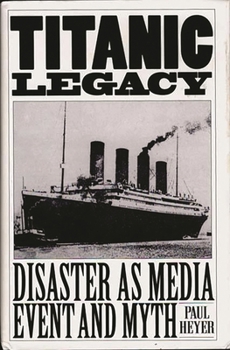Titanic Legacy: Disaster as Media Event and Myth
This is the first book to deal exclusively with the influence and meaning of what media historian Paul Heyer calls our century's first collective nightmare. Using contemporary as well as archival sources, he explores a series of intriguing questions: Why has the TITANIC disaster affected the way we think about ourselves and our technology? How has the media made it into a morality play of mythic dimensions? What impact has that story had on the development of 20th-century communications? This timely and compelling book pays homage to the TITANIC's fateful voyage by attempting to explain not why she struck an iceberg on a cold April night in 1912, but what is surely her greatest enigma: the hold the event still has over us.
Heyer assesses the impact of the TITANIC disaster on the 20th century by exploring the relationship between the event and a variety of media from 1912 to the present. The role of the media in the disaster begins with the TITANIC's distress call. Only a partial success, it resulted in a concerted plea for more wireless regulation. Subsequent newspaper coverage called the sinking the story of the century. The mad scramble for information led to the use of every possible journalistic technique, ethical or otherwise. In his analysis, Heyer puts particular emphasis on the New York Times, which became the paper of record and achieved international prominence for its accurate and sometimes controversial reporting. As soon as press coverage subsided, the TITANIC tragedy resurfaced in literature and film. It has gone on to become one of the most enduring myths in 20th century popular culture. Heyer examines this phenomenon, and shows us how and why, following the discovery of the wreck (1985) and the Challenger disaster (1986), our obsession with the TITANIC has been greater than at any other time since 1912. This is a unique and provocative book that will appeal to readers interested in popular history, media studies, and American studies.Format:Hardcover
Language:English
ISBN:0275953521
ISBN13:9780275953522
Release Date:October 1995
Publisher:Praeger
Length:200 Pages
Weight:1.22 lbs.
Dimensions:0.8" x 6.4" x 9.5"
Related Subjects
Business & Finance Business & Investing Communication Communication & Journalism Communication & Media Studies Communications History Language Arts Media Studies Politics & Government Politics & Social Sciences Public Affairs & Policy Ships Social Sciences Social Services & Welfare Textbooks Transportation Words, Language & GrammarCustomer Reviews
0 rating





